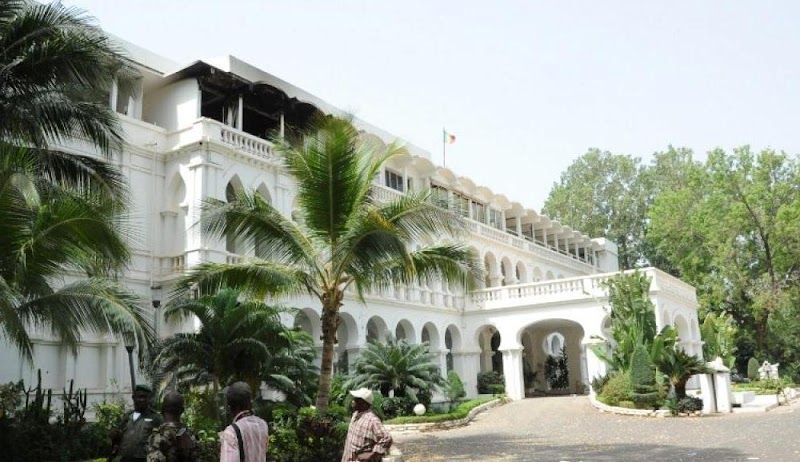Modibo Keïta was the first President of Mali, serving from 1960 to 1968. He was a prominent figure in the Malian independence movement and played a key role in the establishment of the Republic of Mali.
Keïta was born in 1915 in Bamako, Mali. He came from a humble background and his father was a tailor. After completing his primary education, he attended the École Normale William Ponty in Senegal, where he trained as a teacher. He later taught in various schools in Mali and became involved in politics.
In 1946, Keïta founded the Union Soudanaise-Rassemblement Démocratique Africain (US-RDA), a political party that advocated for Malian independence from French colonial rule. He became the US-RDA’s secretary-general and led the party to victory in the 1957 elections, which were the first elections held in Mali under universal suffrage.
When Mali gained independence from France in 1960, Keïta became the country’s first president. He pursued a policy of socialism and non-alignment. He also promoted cultural and educational development, and he established the University of Bamako in 1962.
However, Keïta’s presidency was also marked by economic difficulties and political repression. In 1968, he was overthrown in a military coup led by Moussa Traoré. He was placed under house arrest and died in prison in 1977.
Despite his tragic end, Keïta is remembered as a symbol of Malian independence and unity. He is also credited with laying the foundation for Mali’s education system and cultural development.
- Background and History:
- Born on June 4, 1915, in Bamako, Mali.
- Father was a tailor.
- Completed primary education and attended École Normale William Ponty in Senegal, where he trained as a teacher.
- Taught in various schools in Mali and became involved in politics.
- Political Career:
- Founded the Union Soudanaise-Rassemblement Démocratique Africain (US-RDA) in 1946.
- Led the US-RDA to victory in the 1957 elections, becoming the first prime minister of Mali.
- Became the first president of Mali upon independence from France in 1960.
- Pursued a policy of socialism and non-alignment.
- Promoted cultural and educational development, establishing the University of Bamako in 1962.
- Achievements and Legacy:
- Symbol of Malian independence and unity.
- Laid the foundation for Mali’s education system and cultural development.
- Remembered for his dedication to Malian independence and his efforts to improve the lives of his people.
- Ethnicity:
- Belonged to the Bambara ethnic group, the largest ethnic group in Mali.
- Popular Belief or Something Unique:
- Known for his humble beginnings and his dedication to social justice.
- His name, Modibo, means “born on Monday” in Bambara, reflecting the day of his birth.
Emblem of Mali
To enrich your insights into presidential figures worldwide, also explore some prominent first presidents from other countries, such as Maldives, Malaysia and Malawi. Delving into the leadership journeys of these figures can offer valuable perspectives on their historical significance and pivotal roles in shaping global politics.
The official residence and symbol of the Mali President
10 Iconic Presidents Who Shaped Mali’s History

Mali, a landlocked country in West Africa, has had several presidents since gaining independence from France in 1960. Here are ten of the most popular presidents who have served in Mali.
- Modibo Keita (1960-1968): As the first President of Mali, Keita played a crucial role in the country’s independence and worked towards social and economic development.
- Alpha Oumar Konaré (1992-2002): Konaré was a popular president known for his efforts to promote democracy, human rights, and education. He also focused on economic reforms and infrastructure development.
- Amadou Toumani Touré (2002-2012): Touré served as a transitional president before being elected for two terms. He was praised for his role in promoting peace and stability, especially during the 2002 ceasefire with Tuareg rebels.
- Ibrahim Boubacar Keïta (2013-2020): Known as IBK, Keïta won two presidential elections. His presidency faced challenges, including security issues and political unrest, but he also implemented development projects and infrastructure improvements.
- Moussa Traoré (1968-1991): Traoré’s long tenure as president faced criticism towards the end due to economic decline and political repression, but he also implemented significant reforms in education and infrastructure during his early years.
- Amadou Aya Sanogo (2012): Sanogo briefly served as the head of the military junta after a coup d’état in 2012. Although not an elected president, he had a significant impact on Mali’s political landscape and the subsequent transition to democracy.
- Dioncounda Traoré (2012-2013): Traoré served as the interim president during the political transition following the 2012 coup. He played a key role in stabilizing the country and organizing presidential elections.
- Moussa Traoré (2012-2013): Traoré served as the interim president during the political transition following the 2012 coup. He played a key role in stabilizing the country and organizing presidential elections.
- Modibo Sidibé (2007-2011): Sidibé was the prime minister under President Touré and played an instrumental role during his tenure. Although not an elected president, he was highly influential and known for his efforts in stabilizing the country.
- Soumeylou Boubeye Maïga (2017-2019): Maïga served as the Prime Minister under President Keïta. He played a significant role in addressing security challenges and promoting development initiatives, such as the National Program for Local Development.
These are just a few of the popular presidents who have shaped Mali’s political landscape. Each has had their unique contributions and challenges, but all have played a part in the country’s ongoing development.

